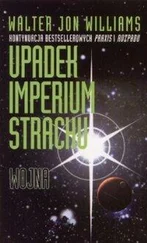Walter Williams - Deep State
Здесь есть возможность читать онлайн «Walter Williams - Deep State» весь текст электронной книги совершенно бесплатно (целиком полную версию без сокращений). В некоторых случаях можно слушать аудио, скачать через торрент в формате fb2 и присутствует краткое содержание. Жанр: Киберпанк, на английском языке. Описание произведения, (предисловие) а так же отзывы посетителей доступны на портале библиотеки ЛибКат.
- Название:Deep State
- Автор:
- Жанр:
- Год:неизвестен
- ISBN:нет данных
- Рейтинг книги:5 / 5. Голосов: 1
-
Избранное:Добавить в избранное
- Отзывы:
-
Ваша оценка:
- 100
- 1
- 2
- 3
- 4
- 5
Deep State: краткое содержание, описание и аннотация
Предлагаем к чтению аннотацию, описание, краткое содержание или предисловие (зависит от того, что написал сам автор книги «Deep State»). Если вы не нашли необходимую информацию о книге — напишите в комментариях, мы постараемся отыскать её.
Deep State — читать онлайн бесплатно полную книгу (весь текст) целиком
Ниже представлен текст книги, разбитый по страницам. Система сохранения места последней прочитанной страницы, позволяет с удобством читать онлайн бесплатно книгу «Deep State», без необходимости каждый раз заново искать на чём Вы остановились. Поставьте закладку, и сможете в любой момент перейти на страницу, на которой закончили чтение.
Интервал:
Закладка:
It was an older presence that she sensed here and much poorer than fashionable Kizilay. Even the little girls wore headscarves, something Dagmar hadn’t seen anywhere else. The present was compounded here with the timeless, present-day Ankara with Hittite Ankuwash and Roman Ancyra, with Byzantine Ankyra and Ottoman Angora, all blended together in the deep blue Anatolian twilight.
The taxi groaned up a steep road and halted in a cloud of biodiesel that tainted the air with the scent of stale olive oil. Ahead was a gate in another wall.
“I’ll tell the cab to wait,” Ismet said.
A guitar strummed chords somewhere above them. Dagmar followed Ismet up a stair and through the gate. She found herself inside a wide tower, perhaps a hundred feet across and fifty high, its courtyard broad enough for some boys to kick a football around. Ismet led the party to a steep stair leading to the battlements. Climbing, she tottered on her Bulgarian heels as one hand brushed the old Byzantine wall for balance. The stair was too much toil after a long meal: she was out of breath when she came out beneath the brightening stars.
She stood on the battlements of the tower, on a wide stone walk. Courting couples embraced in the shadows. Dark shapes sat on the outer wall, kicking their feet over the edge of the abyss. Farther along the wide walkway, some teenage boys clustered around a friend playing a guitar and stared at these formally dressed new arrivals with interest. Across the fort, a tourist in khaki shorts was setting up a camera on a tripod.
“The best view is from there,” Ismet said, pointing to a bastion that stood out on the edge of the hill.
Dagmar gazed doubtfully at the path that led to the bastion. She would have to walk to the outpost along the top of an old wall, with no rail to keep her from falling to a stony landing twenty feet below.
Ismet walked out onto the wall and turned, waiting for her.
She walked to the wall and hesitated, then removed her Bulgarian heels and took a hesitant step onto the smooth old stones. Ismet took a step toward her and held out a hand. She reached for the hand and took it and allowed him to lead her to the bastion. Tuna followed, unimpressed by heights, and Richard more cautiously.
A group of teenage girls in headscarves and long coats were on the bastion, snapping one another’s pictures and giggling. Ismet led her to an unoccupied corner and gestured out at the view.
Below her, Ankara was a stormy sea of red tile roofs, rising and falling with the hills. The towers of isolated developments clustered on hilltops like Crusader castles. A deep red gash on the horizon outlined Ulus in crimson sunset fire, and in the opposite direction the purple shadow of the citadel stretched its long hand toward a rising darkness in the east. To the south, the modern towers of Kizilay stood wrapped in smog.
Dagmar’s heart gave a joyous leap, and she took a deep breath of the night-scented air.
“This is wonderful,” she said to Ismet. “Thank you for suggesting it.”
“I used to come up here when I was a kid,” Ismet said. “My uncle had a shop a few streets north of here.”
“I thought your uncle sold carpets in Istanbul.”
Ismet smiled. “That’s Uncle Ertac,” he said. “It was my uncle Fuad who sold manuscripts up here in the castle.”
“Manuscripts? Like original handwritten manuscripts?”
“Old Ottoman books,” Ismet said. “Printed books. They were in the old Arab script, which no one reads anymore, but they had beautiful illustrations done by hand. So Fuad cut up the books and sold the pages that had pictures on them.”
Dagmar wasn’t sure how to view this literary vandalism.
“Is that allowed?” she said.
Ismet shrugged.
“Apparently it is. Now that the original books are becoming rare, he finds vintage paper and then hires artists to paint pictures in the old Persian style.”
Dagmar was curious. “Does he tell his customers that the pictures are modern?”
Ismet smiled thinly. “I’m certain that he does.”
Dagmar looked up as the teenage girls began to shriek with laughter. Still laughing, they walked rapidly along the old wall to the main body of the tower.
Dagmar’s handheld began to play “ ’Round Midnight.” She answered.
“If the wicked are lurking,” Lincoln said, “they’re pretty well hidden.”
“They generally are,” said Dagmar.
“If the government’s going to give us trouble,” Lincoln said, “it’s going to be in Istanbul.”
“Thanks so much,” Dagmar said, “for massively increasing my paranoia.”
“It’s my job,” Lincoln explained. “Have a lovely evening.”
Dagmar returned her handheld to its holster. Ismet, Richard, and Tuna were looking at her expectantly.
“Lincoln says the hotel’s okay,” she said, and then added, “for now.”
Tuna curled his lip in contempt of the government, stuck his hands in his jacket pockets, and walked back along the top of the old wall to the main body of the tower. Richard fell into his wake. Ismet and Dagmar were left alone on the bastion.
“You were raised in Ankara?” Dagmar asked.
Ismet adjusted his spectacles.
“I lived here for a while. My father is an economist and has worked all over the world-China, Egypt, Germany, England, and Canada. He spent three years in Ankara teaching at the university.”
“You speak American English.”
“I got my degree in the States. In Bellingham.”
“You were planning a career in public relations?”
He looked at her. “No. My degree is in journalism. I still freelance, but PR is a better paycheck.”
“Yes. Print media is dead, or so I keep hearing.”
“You changed your career, too,” Ismet said.
“Yes.” Once she had been a science fiction writer. “How did you know?”
“I looked up your Wikipedia entry.”
She did that herself, now and again. Originally out of vanity, she supposed, but now just to count the inaccuracies. Her biography was really an astounding collection of misinformation, alleviated only by wild speculation.
She never corrected the inaccuracies. She understood that the subject herself could never do that. She’d have to find some authority to quote in rebuttal-but she didn’t know any authorities on herself other than herself.
“The entry mentioned that trouble you had,” Ismet said. “When your friends were killed.”
A chill wind brushed Dagmar’s spine. She felt herself straighten.
“I don’t want to talk about that,” she said.
Ismet was alarmed. “Oh!” he said. “I didn’t mean to offend!”
“No offense,” Dagmar said, and waved a hand dismissively. But she wasn’t about to talk about any of that to a journalist, not even if she was off-the-record.
She realized she had better look up her Wikipedia entry as soon as possible.
Sometimes, she reflected, it was possible to access too much knowledge.
They stayed on the battlements till the last of the sunset faded from the western horizon. All about them were the soft lights of the city, the tall office buildings, the flashing lights on the broadcast towers. Then they went back down the steep, dark stair to their waiting taxi.
Dagmar had the driver drop them a block from their hotel, and they approached carefully and scouted the lobby through plate-glass windows before entering. No one paid them any attention except the young blonde woman behind the desk, who smiled in greeting.
When Dagmar arrived at her room she changed into her khakis and an old giveaway T-shirt from a long-forgotten start-up. Everything else, except for her bathroom case, she packed, and then she blocked the door with her bags to keep anyone from forcing his way in.
She was ready to hit the ground running.
Читать дальшеИнтервал:
Закладка:
Похожие книги на «Deep State»
Представляем Вашему вниманию похожие книги на «Deep State» списком для выбора. Мы отобрали схожую по названию и смыслу литературу в надежде предоставить читателям больше вариантов отыскать новые, интересные, ещё непрочитанные произведения.
Обсуждение, отзывы о книге «Deep State» и просто собственные мнения читателей. Оставьте ваши комментарии, напишите, что Вы думаете о произведении, его смысле или главных героях. Укажите что конкретно понравилось, а что нет, и почему Вы так считаете.











